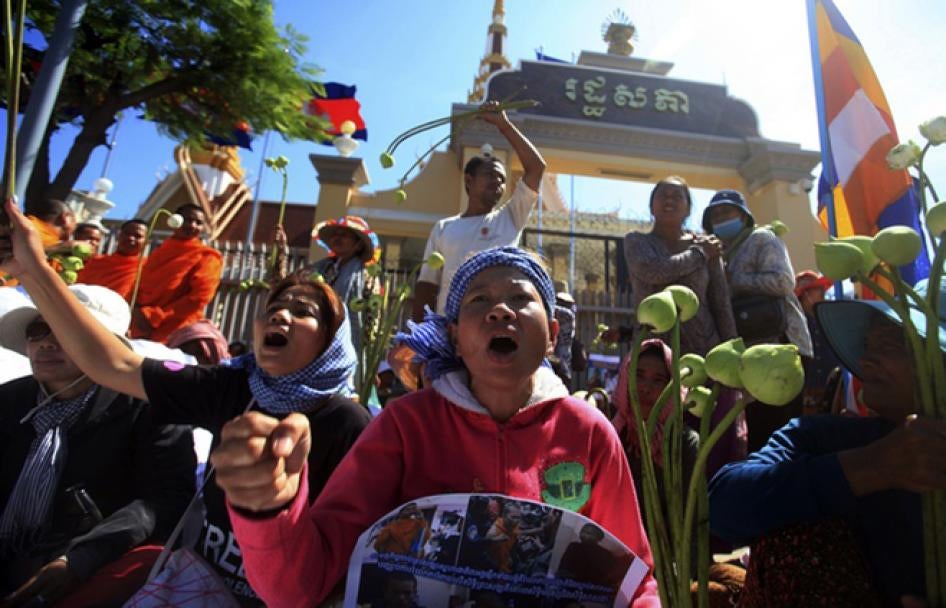Jorge Luis Borges’s Book of Imaginary Beings has a real-world equivalent in Cambodia. Call it the Book of Imaginary Enemies. This imagined book would tell tales of government attacks against rights activists, journalists and other peaceful critics deemed a threat to the government. Cambodian Prime Minister Hun Sen’s subordinates have been working overtime to fabricate new “imagined enemies”. The latest addition to their list was renowned labour activist Moeun Tola.
After Tola spent years toiling for workers’ rights and helping the government assist human trafficking victims, Cambodia’s ruling-party-controlled courts charged him and two other prominent activists – Pa Nguon Teang, a media freedom advocate, and Venerable But Buntenh, an activist monk – of embezzling funeral funds of Kem Ley, an outspoken dissident assassinated in July 2016.
Many Cambodians believe the government was behind Kem Ley’s killing, but instead of investigating and prosecuting those responsible, the authorities filed charges against the activist’s friends, despite Kem Ley’s family publicly stating none of the accused handled any of the funds.
Tola might well receive some respite with the Cambodian Ministry of Labour announcing that the charges against him will soon be dropped. But the cases against Teang and Buntenh remain.
These false criminal cases are emblematic of the systematic scapegoating and harassment of rights activists by Cambodian authorities prior to the country’s general elections in July.
The government has not just acted against labour activists but is on a rampage against all its critics. It has dissolved the main opposition party, jailed its leader, Kem Sokha, and stepped up its longstanding practice of hounding local civil society groups and media. Many Cambodian human rights defenders are living in self-imposed exile or making short trips abroad fearing attacks, politically motivated criminal charges, and other government harassment. The authorities have subjected leading activists and local groups to intensified surveillance. Ultimately, ordinary Cambodians will pay the price in lost legal services, education, health care and job protection.
The rapid end to Cambodia’s long post-Khmer Rouge road to democracy and its declining labour rights situation prompted the European Union in February to warn that Cambodia’s trade privileges under the Everything But Arms trade scheme would be reviewed. This could put market access for Cambodia’s annual $4 billion of exports to the EU at risk.
When it comes to garment workers’ rights, Prime Minister Hun Sen has made lots of promises to workers about wages and benefits. But other critical reforms needed to improve the lives of workers are nowhere on the horizon. Laws impeding workers’ freedom of association, such as the Law on Trade Unions and the Law on Associations and NGOs are still on the books. The Trade Union Law restricts legitimate labour union activities, narrowly defines most representative unions, and impedes collective bargaining. The Law on Associations and NGOs gives the government wide powers to shut down nongovernmental organisations under the garb of regulation. Both laws need to be amended to bring them into line with international standards. The government should also restore the work of the Arbitration Council – a dispute resolution body that was working credibly and effectively – until the government made it almost impossible for workers to bring their disputes before the council.
Last October and November, the United Kingdom Ethical Trading Initiative and major apparel brands sourcing from Cambodia had high-level meetings with Cambodian authorities. The authorities promised important but minor reforms, including revising union registration procedures to make them more transparent.
A group representing about 200 brands sourcing from Cambodia wrote again in March expressing their concerns about the delays in initiating meaningful reforms. They reiterated how “restrictions on minimum wage discussions and lack of freedom of association will make Cambodia an unattractive and expensive place to do business because of increased reputational risks for brands sourcing from Cambodia, regular social unrest at work places (which is a great extra cost to brands) and potential trade tariffs (if the situation does not improve).” They called on the Cambodian government to “put an end to all forms of harassment, including at the judicial level, against above mentioned and all human rights defenders in the country so that they are able to carry out their work without hindrance.”
At this critical moment, brands need to keep a close watch on the treatment of Cambodia’s human rights defenders and media houses. While Hun Sen is looking for imaginary enemies, brands can make lasting friends by continuing to speak out for the people who make their clothes and activists who dedicate their lives to helping ordinary Cambodians.
This will not only help Cambodian workers and civil society, it will prevent reputational damage to brands that, in the modern consumer-savvy era, they can ill afford.









